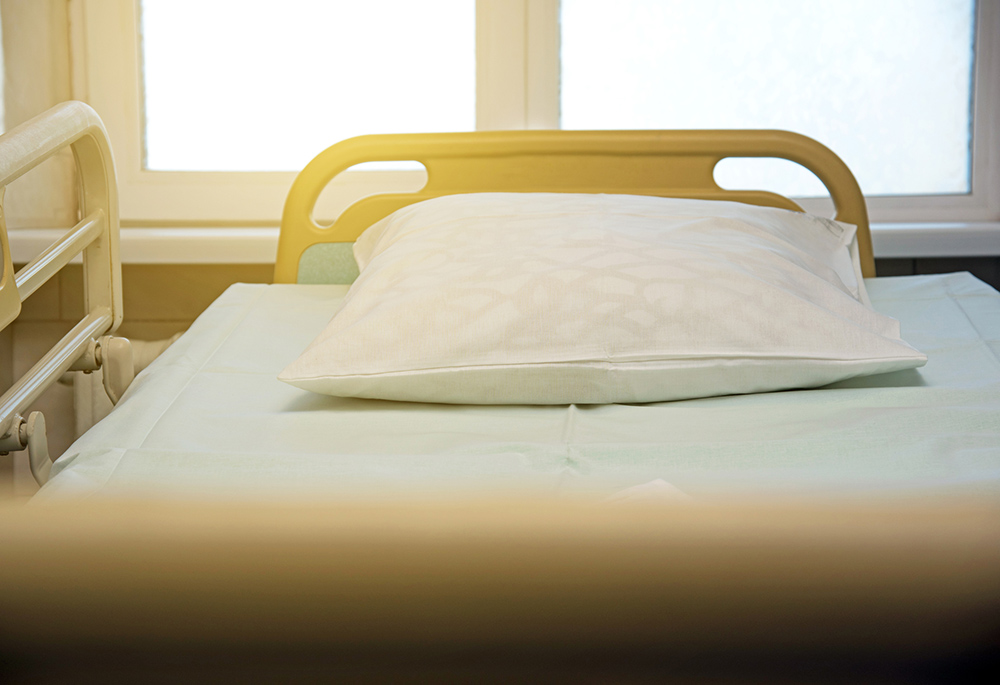
(Unsplash/Andrii Vatsyk)
"We don't think he'll make it," the nurse tells me.
Rodolfo's feet stretched beyond the sweat-thickened sheets of the hospital bed. He has COVID-19 and the virus does not go. His body is embroidered with IVs and tubes stitch his last weeks together. The hospital barring all outside visitors during the COVID surge, I stand outside the ICU room and inhale the antiseptic sanitizer, the voice of the doctor muffled beneath his mask, a nurse aiming the iPad toward Rodolfo, his body transmitted to his family through the screen. The doctor tells them that he was dying, that this was unexpected, any hour now.
"We are sorry. We are sorry. What do you want? What do you need?" they urge.
But his wife knows only to say: "No English. Español ... please, español." And before anyone can contact the interpreter, her daughter — a teenager who long ago learned how to translate the United States to her parents — already makes this responsibility her own. None of us spoke as they wept on the iPad.
A few minutes pass and I call Rodolfo's wife from a phone in the ICU and offer to pray. I press my ear onto the dark slot while they continue to watch him from the iPad. Her voice appeared softly:
"No se que hacer sin el ..." she says.
"We want to be with him," his daughter says.
"Cuentame quien es. Tell me about who he is," I ask.
Rodolfo, the forklift driver. Rodolfo, who loved cumbia music. Rodolfo, who drank too much. Rodolfo, who had volunteered at the parish festival. Rodolfo, who forgot to call when he'd come home late. I hear them cry again, their voices bubbling through the receiver. They want him home. Queremos estar juntos en casa. They do not want a plastic mattress for a death bed. They want sheets that smell like the fabulous lavender of too much cleaning on the weekend. They want to embalm his feet with the golden-toe socks he always purchased from Kohl's and turn on the TV to Cruz Azul vs. Club Tijuana. They want to hold his hand. We cry. I translate last rites. "I am still here for you" is what I want to tell them as if my voice could substitute the warmth of held hands. Then it is the last goodbye. The last heart beats. The last "Te quiero, Papi."
A friend once asked me what it's like to be a hospital chaplain, so here it goes. I am haunted by the names of COVID-19 patients: Gutierrez and Hernandez, Cortez with her glitter-gold nail polish, Alba and Gonzalez where my own abuelas once grew from those family trees. I am haunted by the weight of names I have forgotten: anointings and international phone calls; funerals, boxes of ashes, people cremated and flown to homelands; and so many N95 masks and paper surgical gowns bursting from the trash bins like unfinished laundry.
Advertisement
The impulse in Christian writing is to conclude this essay with an invocation of hope — to think about the resurrected Christ. To tell you, "We are all in this together." To remind you that while somewhere in the hospital someone is dying someone else is giving birth to their first child. To remind you that wildflowers, half-forgotten for months, will speckle the edges of the road again. But I am not telling you about Rodolfo's death solely for your spiritual benefit. This essay is not for an Ash Wednesday homily nor your morning Lenten reflection.
I'm writing because it's been three months since Rodolfo died. I write to show you a complicated, extraordinary life. I want to reveal what I know of that life to you and how it ended. This is how I want to be generous with you, dear reader. I want you to hold his hand, grasp it tightly, at least through my words. Because none of us could, not even his family. I want you to imagine the reek of soiled linen mingled with hand sanitizer and scratch at the itchiness of surgical masks worn for 24 hours. I want you to bless his forehead with holy water and hear his laughter even though I myself never had the chance to hear it. These are both small and big desires. It doesn't take much to find cumbia music on the internet and play one song. Search "Eres Mi Canción" by Rubén Blades. Write it down. Listen to it as you read this essay again. Don't forget this is my desire for you.
My truest relics are no longer displayed in chapels. These are relics no one can pray to, relics without a sanctuary like recipes without a cookbook. You only pray to them if you can remember them.
After Rodolfo died, staff transported his body to the morgue and two custodians arrived to clean his room and replace the sheets with new ones. This is the protocol of environmental services. One custodian slowly tugs at the soiled sheets as if weighed down by a lifetime. The other, who makes the hospital beds by rote, quickly sets clean sheets as stern and straight as paper, only soon to be wrinkled again the next morning. Still, there's something to be said about a perfectly made bed that is like a template for healing. They gather the soiled linen and trash in a plastic bag, and, doing what they must do, cart these relics away.
I have prayed to saints who aren't saints, and I have prayed to them using everything but my palms pressed together. That is to say, I wrote this essay to remember Rodolfo. And now, by what I have shared, I can feel less alone in remembering him with you. Thank you for your company, dear reader, however far you are, or however fast you skimmed, may my memories of Rodolfo be your own too.




